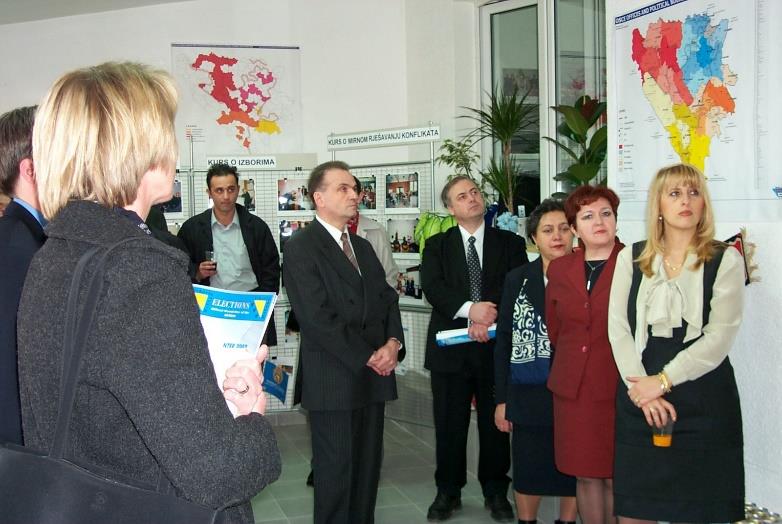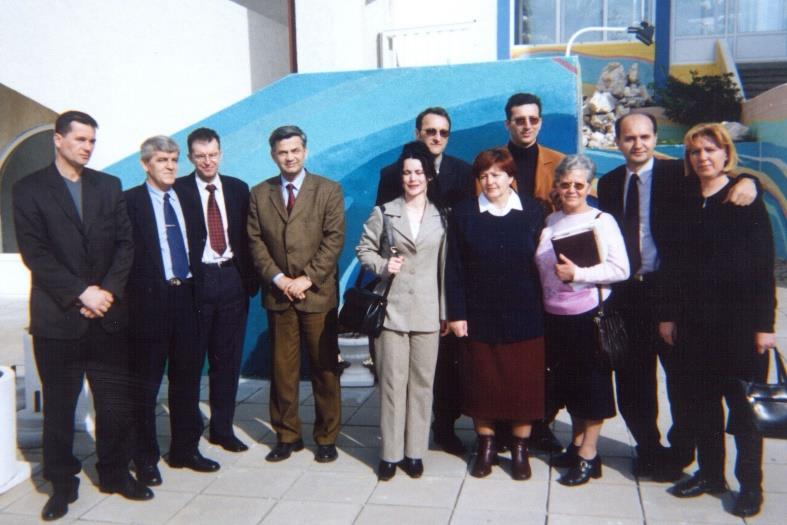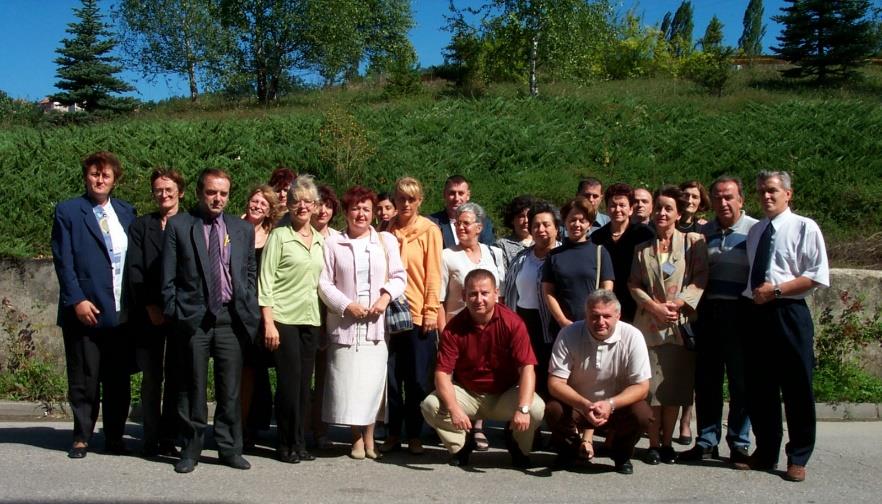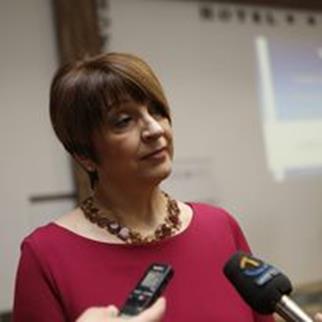
Democracy by Design: How IFES and AEOBiH Built Bosnia’s Election Blueprint
When the International Foundation for Election Systems (IFES) and USAID teamed up to reinforce post-war democracy in the country of Bosnia and Herzegovina (BiH), the goal of the partnership was to support BiH election administration and strengthen Bosnian self-governance. IFES envisioned a future where Bosnia would manage its own elections, but overcoming the challenges facing a post-conflict nation, fraught with deep-seeded ethnic divisions, would prove to be a monumental task.
At the heart of IFES’s work was the creation of the Association of Election Officials in Bosnia and Herzegovina (AEOBiH), a non-governmental, professional association founded in 1999 that would grow to represent local election officials from across the country. With much of the country’s infrastructure destroyed during the war, IFES needed to lay the groundwork for unifying election officials into a long-lasting professional network where they could share lived experiences, coordinate democratic best practices, and advocate for improvements to the electoral process.
25 years later, IFES reconnected with three former employees to hear what it was like to embark on this locally-led development program designed to strengthen the professional skills of elections workers. Beverly Hagerdon, who started with IFES in 1999 as a Training Representative in BiH and later became Chief of Party, was a key player in accomplishing the mission. Reflecting back, Hagerdon says years of IFES’s meticulous work to establish a professional association of election officials was all aimed at one thing: “empowering the local people.” Decades before USAID issued its formal localization policies, IFES was already practicing localization techniques by installing community members in the AEOBiH leadership roles so they could better respond to local challenges. To help lead the Association, Hagerdon hired Irena Hadžiabdić, another IFES employee in the Sarajevo office, to be the Executive Director of the AEOBiH.
Together, from 1999-2003, Hagerdon and Hadžiabdić worked to develop and expand the AEOBiH’s membership to include more municipal election commissioners, eventually reaching a high-point of 1000 members. Hagerdon remembers how difficult it was to get people to participate and believe in the concept of a nationwide association that would serve the entire country. Ethnic division in the region meant citizens were skeptical that one non-partisan organization would be representative of all voters. “It was tricky to find people from across the country to join the board, so that the Association would represent everybody and could be registered at the state level,” Hagerdon admits.

Hagerdon and Hadžiabdić traveled around the country and held meetings in various localities to convince elections officials to join the AEOBiH’s board of directors and to nail down the organization’s bylaws. Hosting these gatherings compelled Bosniaks, Serbs, Croats, and people from different ethnic groups, to be together in social settings that would have been previously unthinkable in an ethnically split society. Hagerdon recalls one particular meeting when the group got stuck at their hotel after a snowstorm and ended the night collectively singing old songs from the former Yugoslavia while bonding over stories from the past. For Hadžiabdić, using an inclusive approach when establishing the roots of the AEOBiH, “helped improve communication in a post-conflict environment,” when many groups were not interacting with each other. Through local capacity building and sheer persistence, Hagerdon and Hadžiabdić created “reconciliation through osmosis,” and laid a sturdy foundation for a long-lived organization.
Once the AEOBiH’s board was installed and its bylaws were cemented in all three official languages, Bosnian, Croatian and Serbian, the organization became the first NGO to be established at the national level in BiH. Now it was time to get to work training members of the Association on how to independently and sustainably conduct free and fair elections in their country.

It was an uphill climb. Hadžiabdić remembers, “no one was experienced in writing project proposals and knowledge about organizational development was lacking. We specially designed an innovative election course, which elected officials attended for several months. Then, educational projects with first time voters and women, so they would become involved in the process to gain a better understanding of the very complex election process in BiH. These efforts were followed with the manuals, which were designed and prepared by the Association’s members.” Through carefully tailored IFES-supported programs, conferences, and media workshops, the AEOBiH matured into a professional body that could adequately support election officials nationwide.

Ernes Jusović, the AEOBiH’s longest serving employee, was hired as a driver at the age of 18 and worked his way up to eventually serve as the current executive director of the AEOBiH Secretariat. Jusović told IFES the post-election conferences hosted by the Association after each election marked one of the organization’s greatest achievements. Because these forums took place immediately following the 2000 and 2002 elections, “the election administration was able to identify problems as well as solutions for the next elections.” By creating a cooperative space where elections officials could identify failures and gaps and discuss lessons learned, the AEOBiH facilitated constructive improvements to BiH’s nascent electoral systems.
By 2003, BiH’s election management systems were gaining experience, growing in capacity, and earning the respect and trust of the country’s electorate. Ahead of the 2004 election, the Election Commission of Bosnia and Herzegovina (ECBiH) took over the running of elections. By that point, “all of AEOBIH’s work was focused on strengthening the administrative capacities of the ECBiH,” Jusović points out. “We were their partners on all projects.” Meantime, IFES graduated its initial programmatic assistance and pivoted to supporting ancillary aspects of elections, such as voter registration, conflict of interest laws, and political finance transparency.
Looking back, the democratic principles set forth by IFES and manifested by the AEOBiH, still serve as the underpinnings for BiH’s election management successes. Most impressive is the fact that Irena Hadžiabdić, the first executive director of the AEOBiH, is now in her third term as president of Central Election Committee of BiH. Hadžiabdić’s ascent to the position of top election official for the entire country is emblematic of the AEOBiH’s enduring impact on Bosnian election management. “I am proud that thanks to the capacity building that was delivered to me thanks to the AEOBiH, I got all the necessary skills to become an election official. This really shows how much the Association’s engagement was beneficial to all election officials, including me,” Hadžiabdić says.

As the citizens of BiH prepare to head to the polls once again on October 6th, the AEOBiH continues its vital work supporting election workers across the nation. The longevity and resilience of the AEOBiH is an illustration of IFES’s strategic use of localization tactics. By combining intentional local engagement and partnerships with local actors, IFES provided the AEOBiH with a successful blueprint for sustainable and credible elections that has persevered for more than 25 years.



